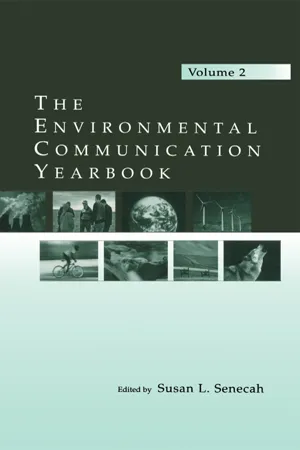
- 184 pages
- English
- ePUB (mobile friendly)
- Available on iOS & Android
About this book
Editorial ScopeThe Environmental Communication Yearbook is a multidisciplinary forum through which a broad audience of academics, professionals, and practitioners can share and build theoretical, critical, and applied scholarship addressing environmental communication in a variety of contexts. This peer-reviewed annual publication invites submissions that showcase and/or advance our understanding of the production, reception, contexts, or processes of human communication regarding environmental issues. Theoretical expositions, literature reviews, case studies, cultural and mass media studies, best practices, and essays on emerging issues are welcome, as are both qualitative and quantitative methodologies. Areas of topical coverage will include:
*participatory processes: public participation, collaborative decision making, dispute resolution, consensus building processes, regulatory negotiations, community dialogue, building civic capacity;
*journalism and mass communications: newspaper, magazine, book and other forms of printed mass media; advertising and public relations; media studies; and radio, television, and Internet broadcasting; and
*communication studies: rhetorical/historical case studies, organizational analyses, public relations/issues management, interpersonal/relational dimensions, risk communication, and psychological/cognitive research, all of which examine the origins, content, structure, and outcomes of discourse about environmental issues.
Submissions are accepted on an ongoing basis for inclusion in volumes published annually.
Audience
Researchers, scholars, students and practitioners in environmental communication, journalism, rhetoric, public relations, mass communication, risk analysis, political science, environmental education, environmental studies, public administrations; policymakers; others interested in environmental issues and the communication channels used for discourse and information dissemination on the topic.
For more information and guidelines for submissions, visit www.erlbaum.com/ecy.htm.
Tools to learn more effectively

Saving Books

Keyword Search

Annotating Text

Listen to it instead
Information
Table of contents
- Cover
- Half Title
- Title Page
- Copyright Page
- Table of Contents
- Introduction
- Contributing to the Environmental Communication Yearbook
- 1 Aggressive Mimicry: The Rhetoric of Wise Use and the Environmental Movement
- 2 The Deliberative Ideal and Co-optation in the Georgia Ports Authority’s Stakeholder Evaluation Group
- 3 One Hundred Years of Nuclear Discourse: Four Master Themes and Their Implications for Environmental Communication
- 4 Narrative Inclusions and Exclusions in a Nuclear Controversy
- 5 Perspectives on Prescribed Burning: Issues and Directions for Developing Campaign Messages
- 6 The Logic of Colonization in the “What Would Jesus Drive?” Anti-SUV Campaign
- 7 David Defeats Goliath on the Banks of the Delaware: Rhetorical Legitimacy and the Delaware Water Gap National Recreation Area Debate
- Author Index
- Subject Index
Frequently asked questions
- Essential is ideal for learners and professionals who enjoy exploring a wide range of subjects. Access the Essential Library with 800,000+ trusted titles and best-sellers across business, personal growth, and the humanities. Includes unlimited reading time and Standard Read Aloud voice.
- Complete: Perfect for advanced learners and researchers needing full, unrestricted access. Unlock 1.4M+ books across hundreds of subjects, including academic and specialized titles. The Complete Plan also includes advanced features like Premium Read Aloud and Research Assistant.
Please note we cannot support devices running on iOS 13 and Android 7 or earlier. Learn more about using the app